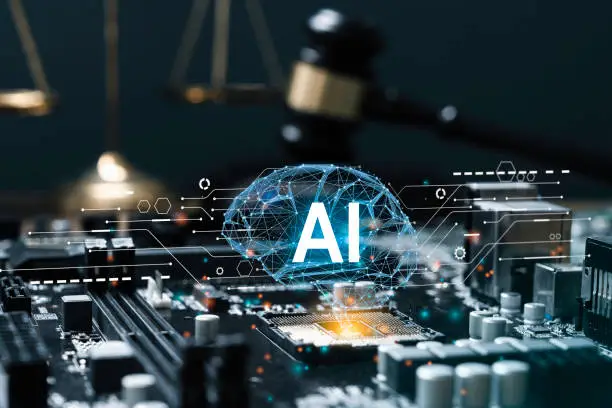As artificial intelligence (AI) continues to reshape industries, one of the most pressing challenges is how copyright law applies to AI-generated content. Generative AI programs are trained on vast datasets, many of which include copyrighted materials such as images, music, and text. This raises a critical question: who owns the rights to the data AI is trained on, and how should creators be compensated for their intellectual property?
While much of the debate around AI and copyright law focuses on the legal intricacies, there is a significant economic opportunity emerging for companies that control valuable data and content. As AI companies look to train their models on proprietary datasets, licensing agreements are becoming an increasingly important business model. This blog will explore the economic opportunities created by licensing, focusing on the value of proprietary data and how companies can capitalize on this new landscape.
What is AI Licensing?
AI licensing is essentially a way for companies to share their valuable data or content—like articles, videos, images, or specialized information—with AI developers, but under clearly defined terms. Instead of handing over full ownership, they set up legal agreements that outline how the data can be used. In return, the company gets paid and keeps control of its intellectual property, all while contributing to the development of smarter, more capable AI tools.
Why is Licensing Important in the AI Ecosystem?
AI models need huge amounts of quality data to learn and improve—and not just any data, but the kind that’s accurate, unique, and relevant. That’s where licensing comes in. For companies that own this type of information, licensing offers a real opportunity to turn their data into a new revenue stream. It also gives AI developers a legitimate, legal path to access the data they need, helping to avoid copyright issues and speed up innovation. In short, it’s a win-win that’s becoming more important as the AI industry grows.
Who Stands to Profit from AI Licensing?
1. The Economic Value of Proprietary Data
One of the key economic opportunities in AI licensing revolves around proprietary datasets. AI models require massive amounts of data to function effectively, and much of this data is owned by companies in sectors like media, healthcare, finance, and energy. Companies that control unique datasets—such as high-definition images, medical records, legal documents, or geospatial information—are in a prime position to monetize their intellectual property.
In fact, according to The Wall Street Journal, businesses with access to rare or hard-to-obtain data could see a significant increase in the value of their assets. AI companies are willing to pay to access high-quality, specialized datasets that can improve the accuracy and performance of their models. As AI technology advances, this demand will likely grow, creating a lucrative market for data owners.
2. Licensing Deals: A New Revenue Stream
Licensing has quickly become one of the primary ways companies are capitalizing on their valuable data. By entering into licensing agreements, companies can provide AI firms with access to their data while retaining ownership. These agreements typically involve financial compensation, either in the form of lump-sum payments or ongoing royalties based on the usage of the data.
A prominent example of such a deal occurred in December 2023, when OpenAI reached a licensing agreement with Axel Springer, one of Germany’s largest publishing houses. Under this deal, OpenAI gained access to publications like Politico and Business Insider for training its models. While the exact financial terms were not disclosed, reports indicated that the deal was worth “tens of millions of euros,” illustrating the potential value of licensing agreements for data owners.
3. Diverse Sectors, Expanding Opportunities
The economic potential for licensing is not limited to media and publishing. Many other industries stand to benefit from the AI boom, including manufacturing, healthcare, biotechnology, and finance. For instance, medical research relies heavily on specialized datasets that AI models can use to make predictions or identify new treatments. In finance, AI algorithms depend on large datasets of market information, financial reports, and economic indicators to make accurate predictions. Companies that own these types of data are well-positioned to enter into licensing agreements with AI firms, turning their proprietary information into financial compensation.
Additionally, sectors like energy and retail also present licensing opportunities. AI models that analyze geospatial data, weather patterns, or consumer behavior could benefit from access to specialized datasets that companies in these industries control. As the demand for AI training data grows, licensing becomes an increasingly important revenue stream for businesses that own valuable, hard-to-obtain data.
Conclusion: Licensing as a Key Driver of AI Growth
The rapid rise of AI technology presents a unique economic opportunity for companies that own valuable datasets. Licensing agreements offer a way for these companies to capitalize on their intellectual property while helping to fuel the growth of AI technology. Whether it’s through agreements like the one between OpenAI and Axel Springer, or through emerging deals in sectors like healthcare, finance, and energy, licensing is shaping up to be a key revenue model in the AI ecosystem.
While the financial benefits could be substantial for those organizations with sought after intellectual property, this could have the opposite financial impact on those companies needing this data to build out their AI systems by having to pay more to acquire it.
As AI continues to develop, the value of proprietary data will only increase, making licensing a critical avenue for businesses looking to unlock new sources of revenue. The future of AI and intellectual property will undoubtedly be shaped by these evolving economic dynamics, offering exciting opportunities for data owners and innovators alike.
Is Your Business Positioned to Profit from the AI Licensing Boom?
At Konza Global Wealth Group, we help clients navigate the evolving landscape of AI, intellectual property, and strategic asset monetization. Whether you’re looking to license valuable data or assess how rising licensing costs may impact your operations, our team can guide you through it with clarity and confidence.
Contact us today to explore how AI licensing trends could shape your financial strategy—and your future.
Frequently Asked Questions
Who is best positioned to monetize AI licensing opportunities?
Organizations with exclusive access to valuable data—such as media companies, healthcare providers, research institutions, and financial firms—are best positioned to benefit. Tech giants with established AI infrastructure and proprietary platforms are also leading players.
What types of content or data can be licensed for AI use?
Text, images, videos, voice recordings, sensor data, medical records (de-identified), financial data, and scientific research are all examples of content that can be licensed for AI training or deployment.
How do companies protect their intellectual property when licensing data for AI?
Licensing contracts typically include terms around usage rights, attribution, data handling, and compensation. Companies can also use encryption, watermarking, and access control measures to secure their data.
This writing is for informational purposes only and does not constitute an offer to sell, a solicitation to buy, or a recommendation regarding any securities transaction, or as an offer to provide advisory or other services by Konza Global Advisory, LLC in any jurisdiction in which such offer, solicitation, purchase, or sale would be unlawful under the securities laws of such jurisdiction.
The information contained in this writing should not be construed as financial or investment advice on any subject matter. Konza Global Advisory, LLC, expressly disclaims all liability regarding actions taken based on any or all the information in this writing.




